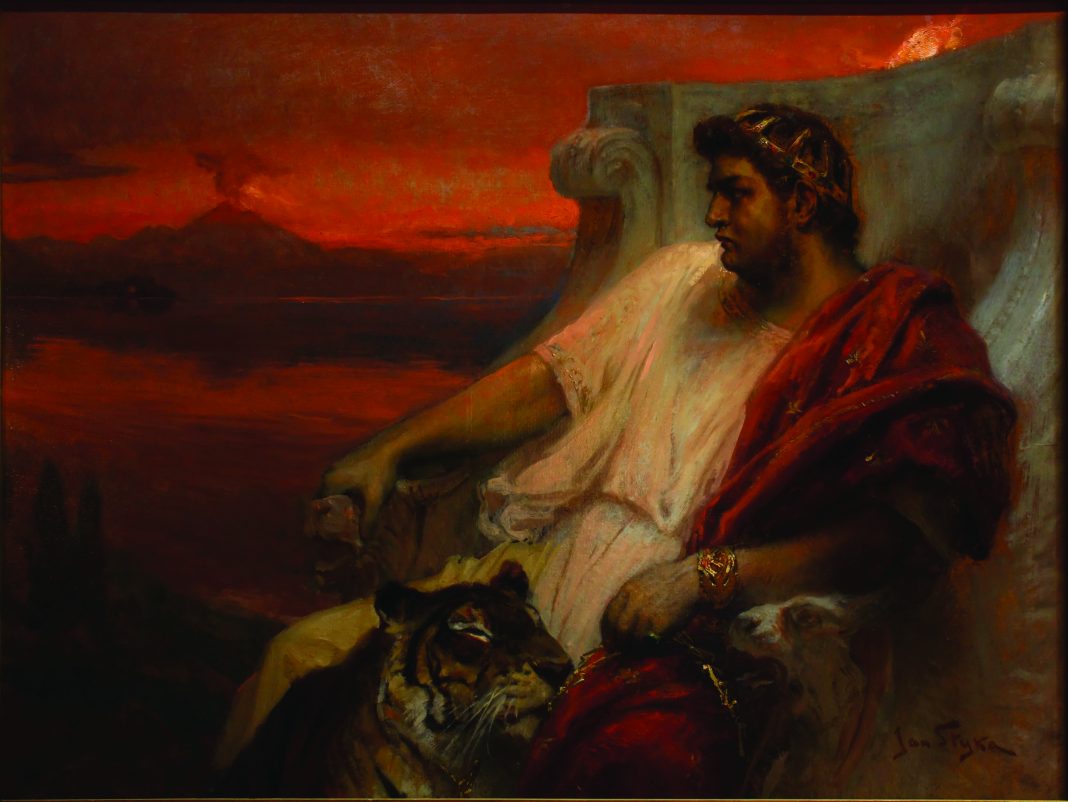There were more bad Roman emperors than good ones, but one of the worst was Nero, who began the empire’s pattern of persecuting Christians.
Clergymen Mike Atkins and Leslie Boone say Nero Claudius Caesar Augustus Germanicus (37-68 A.D.) started his reign at age 16 with a lot of benevolence, prohibiting contests in the Coliseum involving bloodshed, banning capital punishment and lowering taxes; but he was gradually corrupted and ended by having his mother Julia Agrippina assassinated and by kicking his pregnant wife Poppaea Sabina to death before commiting suicide by cutting his throat. Historians say he killed his wife for complaining about his attendance of horse races.
“Nero skewered Christians, dipped their bodies in oil and used them to light the big hall in his palace, thinking it was funny,” said the Rev. Atkins, pastor of Kingston Avenue Baptist Church. “I think he was crazy. He was given too much power and then as he realized all the power he had, he went nuts with it.
“He has been described as a pig of a man.” Blamed by his enemies for starting the fire that burned much of Rome between July 19-23, 64 A.D., so that he could remodel the city, Nero said the Christians had done it and increased his persecution of them.
“He made such a big deal about it that a lot of people started to figure out that the opposite was true, that Christianity was a good thing,” Atkins said.
Asked why governments throughout history have targeted Christianity, the pastor said it has usually been because dictators felt their power was threatened.
“I was in Xiamen and Meizhou, China, for a month in 2003 and met a pastor from an underground church who had just gotten out of prison,” Atkins said. “We felt the hostility. Xiamen has a huge university and a student came up and stared screaming, ‘Why are you here? Why did you come to China?’
“We were handing out little pamphlets in a small village in the mountains and a policeman said, ‘If I see any more of this, I will put you all in prison.’’”
Boone, minister of Andrews Church of Christ, said Nero “was a bad character, but he wasn’t the worst.
“He kept his persecution more localized,” Boone said. “The Emperor Vespasian destroyed the temple in Jerusalem in 70 A.D. and later under Domitian (from 81-96 A.D.) it became empire-wide.
“Nero was a narcissist, real focused on himself and his own desires. Once you get that focus on yourself, it can twist things up a lot, especially when you have the money and power to make things happen the way you want.” Boone said the 19th Century British politician Lord Acton was right when he said absolute power corrupts absolutely. “A regular person could have those flaws in his character, but it will amplify those flaws if you give him a lot of power,” he said.
“It removes the restraints.”
He said Rome was heavily polytheistic, worshipping numerous “gods,” and Romans considered Christians atheistic because they just had one God and refused to worship idols.
“Nero didn’t necessarily make it all happen,” Boone said. “When someone in leadership chooses to do something, it encourages others to do the same.
“The Christians were fighting the whole culture. China is a lot the same now because they think Christianity is undermining their system and you see it in Saudi Arabia, Iran and parts of India because Christianity is seen as an insult to Islam.”




